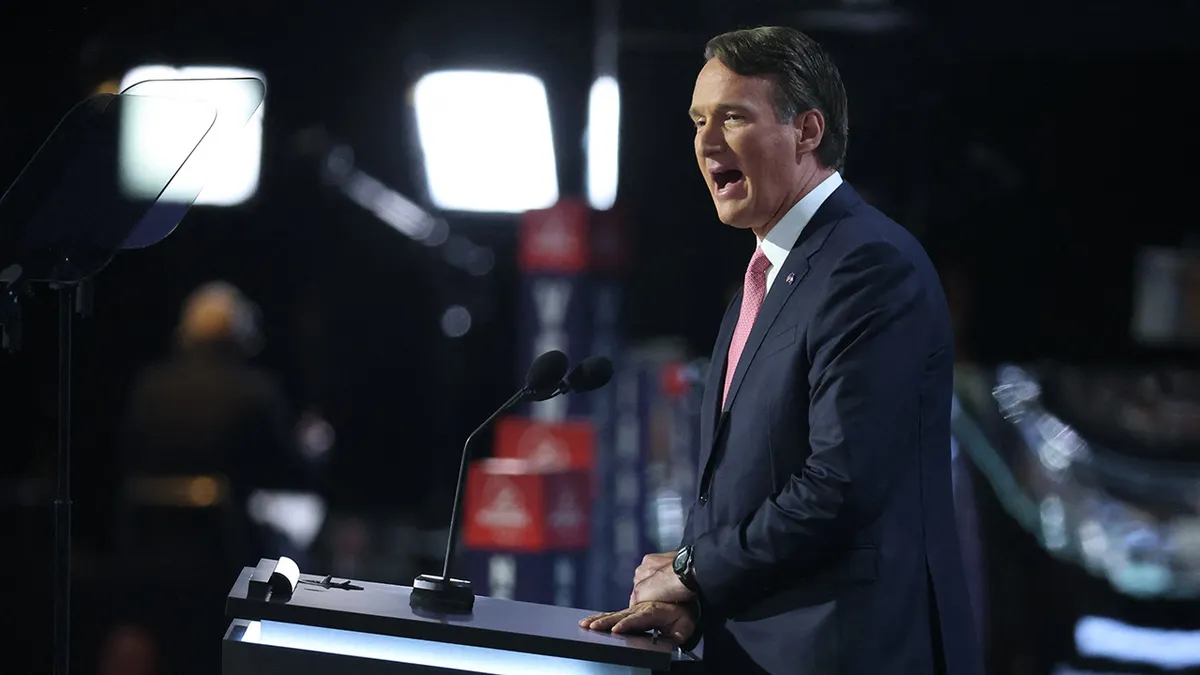GOP governor slams ‘unprecedented’ DOJ lawsuit over removal of noncitizens from voter rolls

The Virginia governor’s office is hitting out at what it says is an “unprecedented” lawsuit by the Department of Justice (DOJ) in response to Gov. Glenn Youngkin’s efforts to remove noncitizens from its voter rolls.
The DOJ is claiming that Youngkin violated the National Voter Registration Act with an executive order that required the election commissioner to regularly update the state’s voter lists to remove individuals who have been “identified as noncitizens” and had not responded to a request to verify their citizenship in 14 days.
Virginia has announced that it has removed more than 6,000 individuals between Jan 2022 and July 2024.
THOUSANDS OF NONCITIZENS REMOVED FROM VOTER ROLLS, DOZENS OF LAWMAKERS WANT ANSWERS FROM GARLAND
Attorney General Merrick Garland speaks during a news conference at the Department of Justice on Tuesday, Sept. 24, 2024, in Washington, D.C. (AP Photo/Mark Schiefelbein)
The complaint says federal law says that states must complete their maintenance program no later than 90 days before an election under a clause known as the Quiet Period Provision. The complaint notes that voters were identified as possible noncitizens if they responded “no” to questions about their citizenship status on certain forms submitted to the state Department of Motor Vehicles (DMV).
“This systematic voter removal program, which the State is conducting within 90 days of the upcoming federal election, violates the Quiet Period Provision,” the DOJ said.
The Justice Department seeks injunctive relief that “would restore the ability of impacted eligible voters to vote unimpeded on Election Day,” and “would prohibit future quiet period violations,” the DOJ said in a statement.
DOJ SUES VIRGINIA FOR ALLEGEDLY PURGING NONCITIZENS FROM VOTING ROLLS TOO CLOSE TO ELECTION

Virginia Gov. Glenn Youngkin speaks during Day 1 of the Republican National Convention at the Fiserv Forum in Milwaukee on July 15, 2024. (REUTERS/Jeenah Moon)
However, in a memo obtained by Fox News Digital, the governor’s office called the DOJ’s move an “unprecedented lawsuit” that targets the state “for appropriately enforcing a Virginia law, signed by then-Gov. Tim Kaine in 2006, that requires Virginia to remove noncitizens from the voter rolls – a process that begins when an individual themselves indicates they are a noncitizen during a DMV transaction.”
The memo is penned by Richard Cullen, counselor to the governor, and says that Virginia’s process has taken place under both Republican and Democratic governors. It also argues that the 90-day quiet period is not relevant “since Virginia conducts an individualized—not systematic—review per Virginia law in order to correct registration records.”
It also says the process is mandated by law and not subject to the governor’s discretion. The memo also says that individuals are notified twice of their cancelation by mail and email and that the state also offers same day voting registration if someone incorrectly indicated they were a noncitizen. Youngkin previously called the lawsuit “a desperate attempt to attack the legitimacy of the elections in the Commonwealth, the very crucible of American Democracy.”
DOJ: ILLEGAL IMMIGRANT STOLE US CITIZEN’S IDENTITY TO VOTE IN MULTIPLE ELECTIONS, OBTAIN AMERICAN PASSPORT

Virginia Gov. Glenn Youngkin speaks during the Republican National Convention at the Fiserv Forum in Milwaukee on Monday, July 15, 2024. (Eva Marie Uzcategui/Bloomberg via Getty Images)
The Virginia order and the subsequent lawsuit are the latest battles over concerns about potential noncitizen voting from Republicans and potential disenfranchisement from Democrats and the administration.
The DOJ sued Alabama last month over the state’s purging of alleged noncitizen voters.
CLICK HERE TO GET THE FOX NEWS APP
Meanwhile, dozens of lawmakers in the House and Senate sought more information from the DOJ over what they saw as a “serious threat” to election integrity from the potential of noncitizen voting.
In August, Republican lawmakers pushed for the SAVE Act, which aimed to require states to obtain proof of citizenship in person when registering an individual to vote and require states to remove noncitizens from voter rolls, to be attached to a spending bill extension to avoid a government shutdown at the end of the fiscal year.
The DOJ itself recently announced that it had charged an illegal immigrant with stealing a U.S. citizen’s identity to vote in multiple elections and fraudulently obtain a U.S. passport.
Fox News’ Sarah Rumpf-Whitten contributed to this report.


;Resize=620&w=390&resize=390,220&ssl=1)

;Resize=(620)&w=390&resize=390,220&ssl=1)